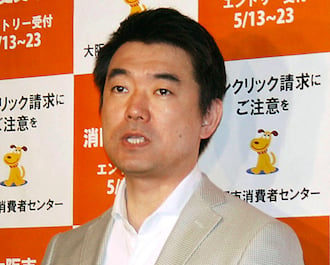Osaka, Japan mayor under fire for calling war-time sex slaves ‘necessary’
Chinese minister says country is ‘shocked and strongly infuriated’
In this May 13, 2013 photo, Osaka Mayor Toru Hashimoto answers reporters’ questions at the Osaka city office in Osaka, western Japan. Osaka’s outspoken mayor has said the system in which Asian women were forced to become wartime prostitutes before and during World War II was necessary to “maintain discipline” in the Japanese military. (AP Photo/Kyodo News) JAPAN OUT, MANDATORY CREDIT
Share

Osaka, Japan Mayor Toru Hashimoto has angered his Chinese and South Korean neighbours by making comments where he called war-time sex slaves — many who were Chinese and Korean — “necessary.”
Hashimoto made the comments during a press conference with reporters Monday, reports Reuters.
“Anyone can understand that the system of comfort women was necessary to provide respite for high-strung, rough and tumble crowd of men risking their lives under a storm of bullets,” Hashimoto told reporters. “At the time, it was a necessary system to maintain military discipline.”
The Reuters report says that an estimated 200,000 “comfort women” were forced to consort with Japanese soldiers in brothels before and during WWII. The woman came from China and Korea, as well as the Philippines, Indonesia and Taiwan, reports BBC News.
The comments didn’t go over well in China, where Foreign Ministry spokesman Hong Lei said China was “shocked and strongly infuriated” after hearing of Hashimoto’s comments.
“Forced conscription of comfort women was a serious crime committed by Japanese militarism during the Second World War and it is also a major human rights issue concerning the dignity of victims,” Hong told AFP. “How to deal with its past will decide how Japan can embrace the future.”
The comments didn’t go over well in South Korea, either, where a Seoul foreign ministry spokesman told AFP: “There is worldwide recognition… that the issue of comfort women amounts to a wartime rape committed by Japan during its past imperial period in a serious breach of human rights.”
By Tuesday, Japanese officials were distancing themselves from Hashimoto’s comments, with cabinet minister Yoshihide Suga reiterating the country’s official position on comfort women. The Japanese government feels “pains towards people who experienced hardships that are beyond description,” Suga said. Japan officially apologized for its use of “comfort women” in 1993.
While the comments didn’t sit well with many, they weren’t out of character for the populist politician, who also leads an emerging conservative political party in the country, called the Japan Restoration party. But even the Japan Restoration Party was careful about endorsing Hahimoto’s statement, reports The Associated Press: “We should ask his real intentions and stop this at some point,” Sakihito Ozawa, the party’s parliamentary affairs chairman, told AP.